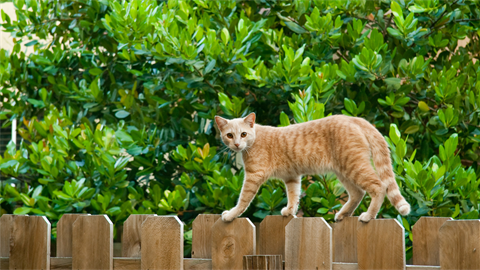Wandering dogs and cats

If an animal is wandering in your neighbourhood, or your neighbour's pet entering your property, you can contact us for advice.
If you cannot locate the owner of a dog or cat walking around your neighbourhood, please contact us.
Dogs and cats on your property
If a dog or cat enters your property without your permission and the animal's owner is known, talk to them and explain your concerns, giving them the chance to fix the problem.
Keep your gates, doors and windows secure to eliminate opportunities for the wandering animal. Don't leave food outside that might attract other people's pets.
Use products that are designed to keep animals away - seek advice from your local pet shop or nursery.
Should the issue persist, you can contact Council for advice.
Cat nuisance
The City of Darebin has a cat curfew in place - from 7pm to 7am, cats must be confined within their own property boundary. Want to know more about our cat curfew? See our cat curfew FAQs.
Cats make wonderful companions for many people, but not everybody enjoys their company. Under the Domestic Animals Act 1994, cats must not trespass on private property without permission, at any time. Residents may also trap unwanted cats found on their properties.
We receive several cat nuisance complaints every week. Cats may cause nuisance by:
- damaging garden beds and children’s sandpits by toileting in them which can create health concerns
- causing unwanted noise and disturbance by mating and fighting with other cats and also leading to dogs barking
- breeding
- spraying offensively on doors, mats, furniture and other areas
- attacking and killing wildlife and domestic animals
- causing stress to resident animals
- aggravating people’s allergies
What to do If you have an unwanted visiting cat
Many cat owners allow their cats to spend time outside. Cats have a tendency to wander and may often spend their time visiting their neighbours (even in nearby streets) or may be “semi-owned” by more than one household, with no fixed address, being fed by multiple members within the community.
What can you do?
- check to see if it is wearing identification such as collar or tags.
- ask neighbours if the cat belongs to them.
- if owner is known, advise them of the issue being caused by their cat visiting your property and ask them respectfully to keep their cat confined - the owner may be unaware of their cat travelling to other properties.
Try using safe deterrents to keep cats off your property. Options include:
- citrus, lavender, vinegar or eucalyptus sprays or other specifically formulated cat repellent sprays
- motion or timed sprinklers
- ultrasonic motion sensors
- plant lavender, pennyroyal or rue (a lot of cats don't like these plants)
- scatter citrus peels throughout garden
Remove items that may attract cats to your property. These may include:
- food and food bowls from resident animals
- ensure your BBQ is cleaned after use
- ensure rubbish bins are secure
- clear away hard rubbish and clutter
- board up holes and block access to garages, garden sheds, under your house etc.
- keep bird feeders up high and away from potential access points of cats
- clean bird seed off ground
- ensure animals pens, such as chicken coops, are secure
- cover children's sandpits when not in use
- water gardens at night if the cat is digging in your garden - most cats don't like wet surfaces and muddy paws.
Cat trapping in Darebin
Our Animal Management Team is not currently leasing cat traps to the community.
Some animal rescue organisations may lease traps and they can also be purchased online or in specialty stores for private use.
Should you contain a cat in a trap during business hours, you may lodge a request with Council to collect by contacting our Customer Service Team.
Please note: Only cat-specific cat traps should be used for this purpose. The use of possum traps to contain cats is illegal and Council will not accept any cats trapped this way.
Where do stray animals go?
Unregistered cats and dogs and those without owner identification are taken to the wat djerring Animal Facility.
Surrendering your pet
Animal surrenders are now accommodated by appointment only. Requests are managed by the staff at the wat djerring Animal Facility, operated by the City of Whittlesea, our pound service provider.
If your circumstances have changed and you need to surrender your pet, please fill in the surrender application form and a staff member from the wat djerring Animal Facility will be in contact with you to discuss an appointment or alternative options.
wat djerring Animal Facility (previously known as Epping Animal Welfare Facility)
Address: 20 Companion Place, Epping VIC 3076
Phone: 03 8401 6200
Website: www.whittlesea.vic.gov.au/animalfacility
Email: AnimalFacility@whittlesea.vic.gov.au
More information
Customer service
Call: 03 8470 8888
Email: mailbox@darebin.vic.gov.au